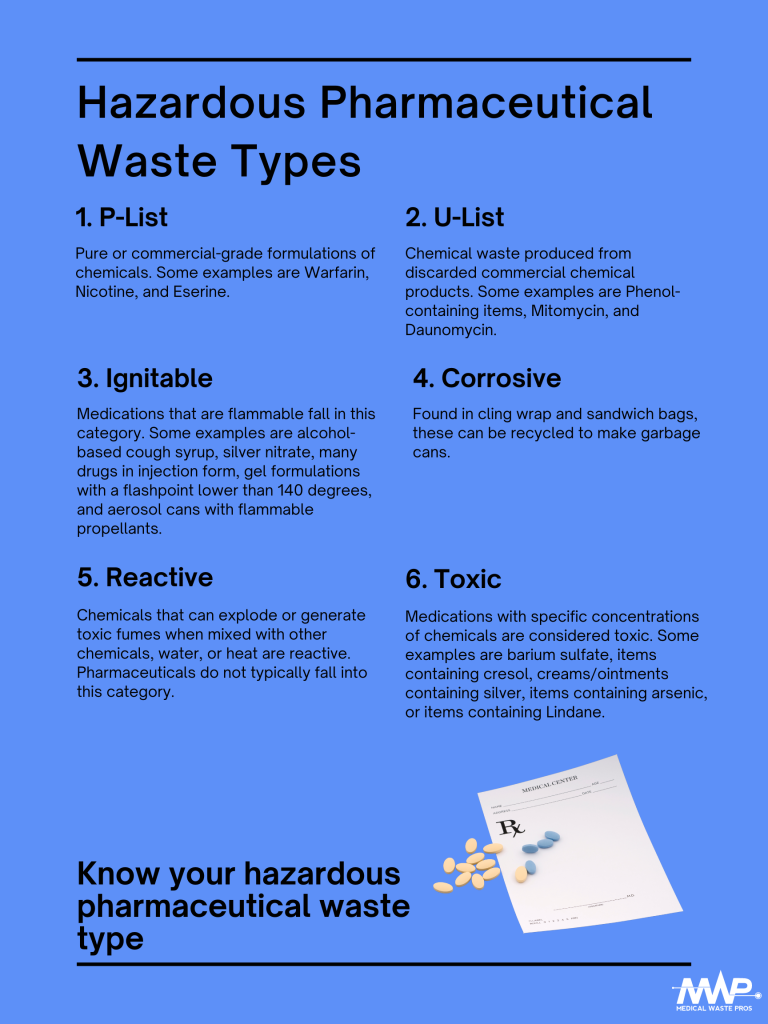How to Dispose of Hazardous Pharmaceutical Waste

Medication is a critical component of healthcare. Whether administering or filling medications, pharmaceutical waste is unavoidable. When this waste isn’t handled properly, it poses a risk to the environment and human health.
As a result, the Environmental Protection Agency (EPA), Drug Enforcement Administration (DEA), and each state’s Department of Public Health govern the disposal of these medications with strict and complicated regulations. Professional waste companies can help you comply with legal regulations and safely dispose of your pharmaceutical waste.
Read on to learn more about the types of hazardous pharmaceutical waste and what safe, compliant disposal of this waste looks like.
What Is Pharmaceutical Waste?
Pharmaceutical waste is most commonly generated by hospitals, clinics, pharmacies, and businesses like medical spas. Pharmaceutical waste can include expired medications, vials or bags containing trace substances, packaging, protective gear, and spilled liquids or pills.
Types of Hazardous Pharmaceutical Waste
Pharmaceutical waste is considered hazardous based on its chemical properties. The Resource Conservation and Recovery Act (RCRA) defines a medication as hazardous if it contains P-list or U-list chemicals, or if it has certain characteristics.

P-List
These are pure or commercial-grade formulations of chemicals. They are usually identified as acute hazardous wastes. Some examples are Warfarin, Nicotine, and Eserine.
U-List
These include chemical waste produced from discarded commercial chemical products. They are also identified as toxic wastes. Some examples are Phenol-containing items, Mitomycin, and Daunomycin.
Ignitable
These are medications that are flammable. Some examples are alcohol-based cough syrup, silver nitrate, most drugs in injection form, get formulations with a flashpoint lower than 140 degrees, and aerosol cans with flammable propellants.
Corrosive
Corrosive waste is acidic or alkaline wastes which can corrode or dissolve flesh, metal, or other materials. Examples include strong acids, alkaline degreasers, and water/wastewater treatment chemicals.
Reactive
These are chemicals that can explode or generate toxic fumes when mixed with other chemicals, water, or heat. Pharmaceuticals do not typically fall into this category. Examples of this type include pyrophoric metals such as sodium, ethers, and peroxides.
Toxic
Toxic medications have specific concentrations of chemicals. Some examples are barium, sulfate, items containing cresol, creams/ointments containing silver, items containing arsenic, or items containing Lindane.
You should handle these types of medications just like any other hazardous waste. Extra precautions in their disposal must be taken to eliminate pollution and health risks. Luckily, hazardous pharmaceutical waste only accounts for approximately 5-10% of all pharmaceutical waste.
Safe Disposal of Hazardous Pharmaceutical Waste
Safe disposal of hazardous pharmaceutical waste is possible with staff training and clear, easy-to-follow waste management guidelines. Here are some steps you can take when safely disposing of pharmaceutical waste.
Staff Training
Healthcare organizations should receive training on waste segregation, handling, and disposal to ensure compliance with the EPA and other regulations. Additionally, the Occupational Safety and Health Administration (OSHA) requires Bloodborne Pathogen Standards and HazCom training for anyone that may encounter hazardous chemicals and materials on the job.
Color Coding
Different types of medical waste require different treatment to make them safe for disposal. Therefore, color coding makes waste easier to identify and treat properly.
Red bins are for biohazardous materials, including blood and bodily fluids. Yellow bins are for radioactive materials, containing items used in chemo or radiotherapy. Black bins are for hazardous materials, like dangerous medications and harmful chemicals. Blue bins are for non-hazardous solid waste, which can include regular medications and general pharmaceuticals.
Hazardous Waste Manifest
The EPA and US Department of Transportation require a hazardous waste manifest. This manifest is a document containing information about the type and quantity of waste. It includes signatures from all parties involved in the generation and transportation of medical waste, as well as the disposal process. Pharmaceutical waste generators should retain this document for their records.
How Medical Waste Pros Can Help
Medical Waste Pros will help your hospital, clinic, or business dispose of pharmaceutical waste safely and affordably. Looking for biohazardous or pharmaceutical waste services? What about used sharps and pill bottle recycling? We’ve got your disposal needs covered.
We offer medical waste disposal management services to assist you every step of the way. Call us today at (888) 755-6370 or fill out the form to connect with a provider near you. We will help you select containers, make a schedule, and build a system that is right for your organization.










